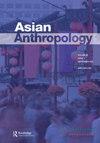运动中的亚洲主义:太平洋西部和东部日本旅居者中的亚洲自我和定制亚洲
Q2 Social Sciences
引用次数: 1
摘要
摘要本文通过对旅居加拿大、澳大利亚和新加坡的日本侨民的实践和论述,对“身为亚洲人”的概念进行了批判。本文采用亚细亚主义研究的框架,阐述了在太平洋西部(加拿大和澳大利亚)和太平洋东部(新加坡)的日本旅居者如何以不同的方式选择“身为亚洲人”的身份。在加拿大和澳大利亚,“亚洲人”在日常生活中是一个隐蔽的类别,它为日本旅居者提供了几乎唯一的合法旅居策略。同时,在新加坡,“亚洲人”是一个公开的话语和自我重建的范畴,经常与“西方(erners)”和“日本(ese)”形成对比;2) “身为亚洲人”只有在讲英语、全球化的城市地区才具有积极意义;3)“身为亚洲人”只有在定制的、进步的叙事中才有意义。本文章由计算机程序翻译,如有差异,请以英文原文为准。
Asianisms in motion: Asian selves and customized Asia among Japanese sojourners in the Pacific West and East
Abstract This article critiques the concept of “being Asian” by focusing on practices and discourses of Japanese sojourners living in or moving between Canada, Australia, and Singapore. By adopting the framework of Asianist studies, the article elucidates how the identification of “being Asian” is chosen by individual Japanese sojourners differently in the Pacific West (Canada and Australia) and the Pacific East (Singapore). In Canada and Australia, “Asian” is a covert category in daily practice that provides Japanese sojourners with almost the only strategy to legitimate their sojourn. Meanwhile, in Singapore, “Asian” is an overt discourse and a self-reconstructive category often contrasted with the “West(erners)” and “Japan(ese).” Nevertheless, the article points out that 1) Asian selves are not necessarily free from West- and Japan-centric hierarchical worldviews; 2) “being Asian” has positive meanings only in Anglophone, globalized, urban areas; and 3) “being Asian” is meaningful only in customized, progressive narratives.
求助全文
通过发布文献求助,成功后即可免费获取论文全文。
去求助
来源期刊

Asian anthropology
Social Sciences-Anthropology
CiteScore
1.60
自引率
0.00%
发文量
25
期刊介绍:
Asian Anthropology seeks to bring interesting and exciting new anthropological research on Asia to a global audience. Until recently, anthropologists writing on a range of Asian topics in English but seeking a global audience have had to depend largely on Western-based journals to publish their works. Given the increasing number of indigenous anthropologists and anthropologists based in Asia, as well as the increasing interest in Asia among anthropologists everywhere, it is important to have an anthropology journal that is refereed on a global basis but that is editorially Asian-based. Asian Anthropology is editorially based in Hong Kong, Taiwan, and Japan, but welcomes contributions from anthropologists and anthropology-related scholars throughout the world with an interest in Asia, especially East Asia as well as Southeast and South Asia. While the language of the journal is English, we also seek original works translated into English, which will facilitate greater participation and scholarly exchange. The journal will provide a forum for anthropologists working on Asia, in the broadest sense of the term "Asia". We seek your general support through submissions, subscriptions, and comments.
 求助内容:
求助内容: 应助结果提醒方式:
应助结果提醒方式:


